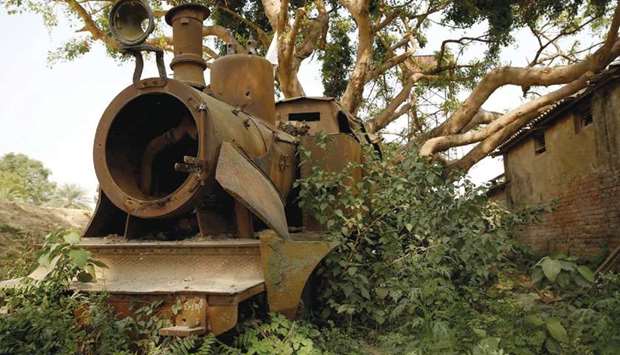Shrubs spring up around a rusted train engine in southeast Nepal, with carriages propped up on bricks and tall grass growing over abandoned wheels, offering mute testimony to years of neglect suffered by an abandoned railway line.
First built as a cargo line to carry wood from Nepal to India in 1937, it was once the lifeblood of the community in Janakpur, running 29km from Jainagar in India’s neighbouring eastern state of Bihar.
The train service, which eventually became a cheap way for travellers to cross the international border, closed in January 2014 for a $100mn project to upgrade the colonial-era narrow rail track into a broad-gauge line.
Now the only sign of life is laughing children, who chase each other through the disintegrating carriages, climbing on rusting benches and tumbling over one another.
But the closure hit Janakpur hard, with close to 130 railway employees losing their jobs, said Tula Bahadur Dangi, acting general manager of Nepal Railway Corp, who has worked for the company for 18 years.
Travellers have been forced to use buses instead, paying three times the price of a train ticket for a journey four times as long, which is complicated further during the monsoon rains that make the roads muddy.
Other trades dependent on the railway have also suffered.
“There is no business now, compared to when there was a train,” lamented Rajendra Kushwaha, who ran a bookstall at Janakpur railway station for 45 years.
The revamp of the railway, set to be completed next March, presents clear signs of renewal and the improvements to come.
Construction is nearly 80% complete, with bridges and a total of 14 stations built along the route, where land has been levelled for the laying of track to extend the line northwards a distance of 69km.
The expansion will create 350 jobs, Dangi said, complete with plans for a museum to showcase the old German-made abandoned carriages and engines.
The expanded route would also make it easier for tourists to visit the Ram Janaki temple, a Unesco World Heritage site that devout Hindus believe to be the birthplace of the deity Sita.
Completion can’t come quickly enough for Rafid Kabadi, who drove trains on the old line for 25 years, the third generation of his family in the job.
“I am sad the train stopped, but happy the new one is coming,” he said, standing before a rusted carriage with his grandson.

Plants grow on the abandoned train at the workshop of Nepal Railways Corporation Ltd in Janakpur.
